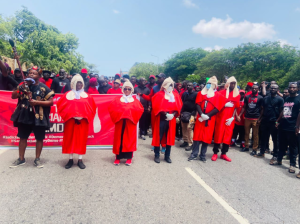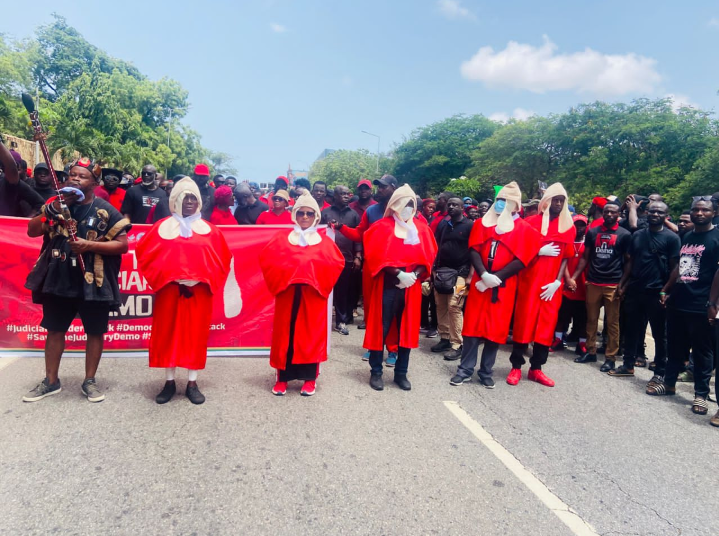
In Accra, a coalition spearheaded by the New Patriotic Party (NPP) demonstrated to demand the reinstatement of Chief Justice Gertrude Torkornoo, whose suspension by President John Dramani Mahama has ignited significant backlash from various political factions.
Clad in red clothing, armbands, and headgear, the protesters took to the streets in large numbers, marching through the main streets of Accra, where they submitted a petition to the Judicial Secretary, Parliament and the Presidency.
The political parties include the New Patriotic Party (NPP), Liberal Party of Ghana (LPG), National Democratic Party (NDP), and People’s National Party (PNP). According to the parties, their action was in defence of the Constitution to promote and safeguard the country’s democracy.
The parties, in their joint statement, claimed that there was a blatant disregard for the rule of law, describing the suspension as a direct assault on the judiciary and an attempt to erode the independence of the country’s legal system.
The group also alleged that the suspension of the Chief Justice is aimed at legitimising John Mahama’s bid for a third term as President in the 2028 general election.
Suspension of the Chief Justice
Following the determination of a prima facie case in the three petitions asking for the removal from office of Chief Justice Gertrude Sackey Torkornoo, President John Dramani Mahama has suspended her and set up a five-member committee to inquire into the petitions.
Meanwhile, the contents of the petition have not been made public, as the 1992 Constitution of Ghana stipulates that all proceedings related to such petitions should be conducted in camera.
Article 146 of the Constitution outlines the procedure for the removal of Justices from the Superior Courts. It states that a Justice may be removed from office only for stated misbehaviour or incompetence, following a specific process. This includes: a petition must be presented to the President, detailing the grounds for the removal. The President then appoints a committee to inquire into the matter. This committee typically consists of persons with legal expertise, including judges and other qualified individuals.
It continues that the committee appointed under clause (6) of this article shall inquire into the petition and recommend to the President whether the Chief Justice ought to be removed from office.
Clause eight (8) specifies that all proceedings under this article will be conducted in private, and the Justice or Chairman who is the subject of the petition has the right to defend themselves either personally or through legal representation. The article emphasises the need for fairness in the process and guarantees the rights of the Justices involved.
Under Article 146(10) of the constitution and by the advice of the Council of State, the President has, by a warrant, suspended the Chief Justice with immediate effect pending the outcome of the committee’s proceedings.
According to the constitution, where a petition has been referred to a committee under this article, the President may – (a) in the case of the Chief Justice, acting by the advice of the Council of State, by warrant signed by him, suspend the Chief Justice;
“(b) in the case of any other Justice of a Superior Court or of a Chairman of a Regional Tribunal, acting by the advice of the Judicial Council, suspend that Justice or that Chairman of a Regional Tribunal. “(11) The President may, at any time, revoke a suspension under this article,” Clause 11 added.
By Godwin Dzigbanu, African Eye Report


